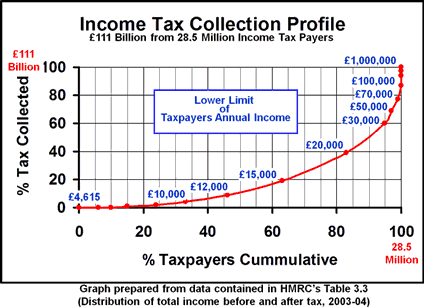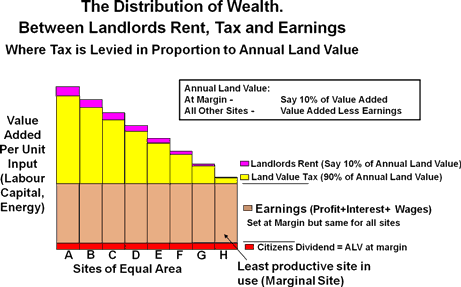Progress without Poverty
Page 6 of 7
The Impact of Current Taxes
Staying with practical issues we now turn to one example where the irrationality of current taxation seems to be particularly conspicuous – income tax. It is remarkable that most of the people that pay income tax are people who receive in earnings from their work less than is necessary to provide for themselves and their families. Indeed even those earning less than the government’s declared ‘minimum wage’ are obliged to pay this tax and their employers must incur all the expense and trouble of acting as the government’s tax collectors. We might note in passing however that income tax is not the main tax burden that the poorest in society must pay. This shameful feature goes to those taxes that are levied on the goods and services that everybody needs or has become accustomed to regard as important to their welfare and happiness. According to the government’s own figures indirect taxes take away from people in the lowest income band as much as 34% of their disposable income when they spend it!
Figure 12
Figure 12 shows how the £111 billion of income tax revenue was collected from some 28.5 million UK citizens during the year for which the latest analysis is available. It is based upon Table 3.3 in HMRC Report for 2003/4. We may note how by far the majority of the revenue is collected from those whose income is at the top end of the ranges indicated. Two points on the graph have been highlighted.
- The first is at the point where it can be seen that 63% of the poorest taxpayers in the country some 17.6 million people pay only 20 % of the tax revenue (£22.2 bn.).
- The second point is where it can be seen that some 40% of the tax revenue is drawn from the 5% of taxpayers whose income is over £30,000 pa.
The scope for relieving millions of people and hundreds of thousands of firms from the tax burden is very clear. When one also considers that the government itself is the largest employer of low paid people and that its wage bill and costs are inflated by the tax it collects from its employees’ earnings the extraordinary state of affairs is seen as even more irrational.
Citizens’ Dividend
We close this excursion into the wonders and mysteries of the UK tax system with another speculative suggestion. It has been pointed out that the introduction of full land enclosure without the observance of a corresponding duty by the beneficiaries to the community as a whole has a profound influence on the way that wealth produced by human enterprise is distributed. Its main impact is noted at the margin of production where there is no natural ‘economic rent’ but where a landlord’s claim is recognised and exercised.
Without a landlord’s claim, marginal land anywhere would be freely available to all. Subject to sensible planning controls it would then be possible for any enterprising soul to set up on their own account, build themselves a house and start a business. They may also need credit for their initial capital equipment and that has been touched upon above. This feature of ‘free land at the margin’ is critical in providing all individuals with freedom from the bondage that comes with having to seek another’s permission merely to set up home and live.
It is analogous to the liberty that is denied a slave and as has been pointed out by others it would have made little difference to Man Friday if Robinson Crusoe had owned either Man Friday himself or the whole island! We have then a problem if we are to respect the idea of private ownership of land without collecting the full economic rent for the community. One possible line of approach that is attractive to this writer is that which does not just use the public revenue collected from land values to fund community expenditure but uses some to redistribute to all citizens in recognition of their contribution to the welfare of all.
The term Citizens Dividend has been adopted by some who advocate this approach. It has several attractive features. First it might mean that every citizen could be in receipt of a sum of money such that they could afford to pay the landlords claim that applies at the margin of production. It is important to note that this would not be effective in the absence of a Land Value Tax since it would merely inflate the landlords claim accordingly. This would not be viable for the landlord where land value tax was applied since it would inflate his tax liability.
Secondly it could reinforce, and for some establish, the link between citizenship and the welfare of both the community and all individuals. Everybody could have something to loose if they failed to observe their duties as citizens. Fines would become a practical alternative to prison for offenders who chose not to obey the laws of society. From a political standpoint within a free democracy the fact that everybody, and all voters would be recipients, could make the introduction of land value taxation much more easily acceptable. It would of course also provide a measure of reassurance to those householders that found themselves in a position of negative equity.
Figure 13

Figure 13. shows how this might work where the unit input approach gives rise to the same citizens dividend on each site.